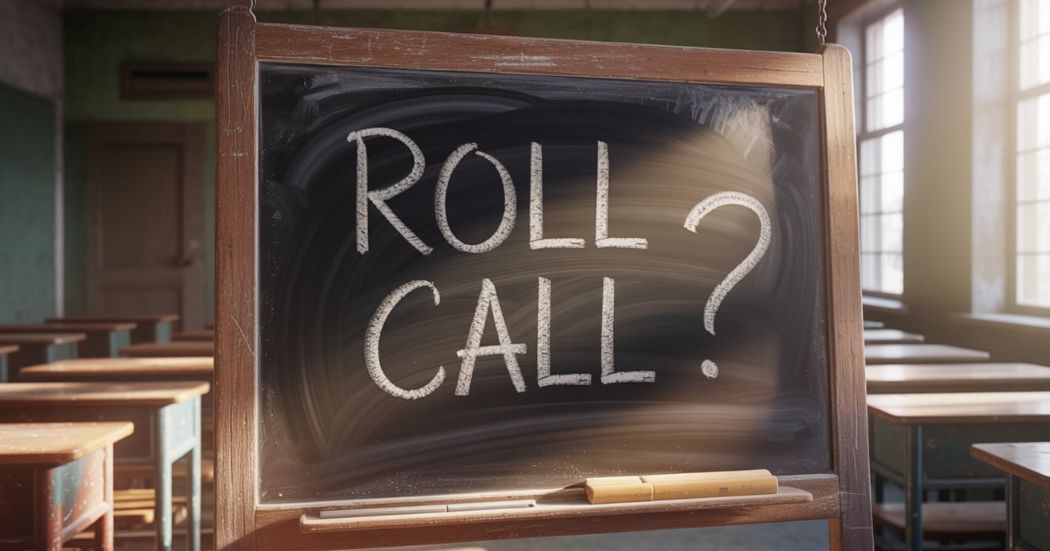Have you ever typed out a phrase and paused “Is it ‘role call’ or ‘roll call’?” You’re not alone. These two expressions sound exactly the same (they’re homophones), but they carry very different meanings. Misusing them, especially in formal writing or professional settings, can lead to confusion or even embarrassment.
In this article, we’ll break down the difference between “role call” and “roll call”, explore the meanings of “role” and “roll”, and give you clear, real-life scenarios to help you remember the correct usage. By the end, you’ll not only know which is which, but you’ll also feel confident in using them correctly.
Understanding “Roll Call” The Correct Phrase
Let’s start with the correct term: “roll call.”
What is Roll Call?
“Roll call” refers to the process of calling out names from a list to determine who is present, most commonly in settings like schools, the military, or meetings.
The word “roll” in this context comes from an old usage where names were written on a “roll” of parchment think of a scroll. So, “calling the roll” meant reading names off that list.
📘 Example Scenarios for “Roll Call”
- In a Classroom: The teacher conducted a roll call at the start of the day to make sure all students were present.
- In the Military: Every morning at 0600, the platoon gathers for roll call to report their presence to the commanding officer.
- At a Board Meeting: Before the vote, the secretary did a roll call to ensure there was a quorum.
- In Emergency Services: After responding to the fire, the captain held a roll call to account for all firefighters.
In all of these examples, someone is reading names aloud to check attendance. That’s the key definition of “roll call.”
Why “Role Call” is a Mistake (Most of the Time)
Now let’s talk about the incorrect but often mistakenly used version: “role call.”
What is “Role Call”?
The phrase “role call” is not standard English. It’s typically a misspelling or misunderstanding of “roll call.” That said, if you really wanted to invent a new phrase, “role call” could hypothetically mean calling out people’s roles or functions—but that’s not the accepted usage.
Why the Confusion?
The confusion stems from the homophones:
- “Roll” can mean a list or to rotate.
- “Role” refers to a function, duty, or part played by someone (as in a job or a character in a play).
They sound the same, but they mean very different things.
When “Role” is the Right Word
Although “role call” is generally incorrect, the word “role” is useful and widely use just not with “call.”
Proper Use of “Role” in Sentences
- In a Job Description: Her role in the company is to manage client communications.
- In a Theater Production: He auditioned for the role of Hamlet in the school play.
- In a Family: He plays the role of caregiver for his aging parents.
In all of these cases, “role” means a duty, responsibility, or character someone assumes.
Mnemonic Trick: How to Remember the Difference
Here’s a simple tip to help you remember which one to use:
- If you’re calling out names, think “roll call”—like names on a roll or list.
- If you’re talking about someone’s position or function, think “role”—like playing a role in a movie or job.
✅ “Roll call” = attendance
❌ “Role call” = incorrect (most of the time)
What If You Meant Both?
You might ask, “Can ‘role call’ ever be used if I’m calling out people’s roles in a meeting or event?”
Technically, you could say something like:
“Let’s do a quick role call to see who’s handling what during the conference.”
In that context, it’s arguably logical, but it’s still a play on words—not standard English. If you use it, be aware that some readers or listeners might think you made a mistake.
For clarity and professionalism, you’d be better off saying:
“Let’s review everyone’s roles for the event.”
or
“Let’s go over the assignments for each team member.”
Pop Culture and Misuse of “Role Call”
Interestingly, the phrase “role call” sometimes shows up in entertainment or social media—often deliberately for effect. For example, a tweet might say:
“Here’s a role call of all the amazing women in this project!”
Here, the writer is probably doing a pun—blending the idea of a “roll call” (naming people) with “roles” (what they did). While it may work informally or playfully, it still isn’t standard English.
If you’re writing formally or professionally, you should stick with “roll call.”
Quick Reference: Role vs. Roll
| Word | Meaning | Example |
|---|---|---|
| Roll (noun) | A list, especially of names; also a physical roll (like a bread roll or scroll) | The teacher took roll at the start of class. |
| Roll (verb) | To turn over or rotate | The ball began to roll down the hill. |
| Role (noun) | A job, function, or character | She played the role of Juliet in the school play. |
Final Thoughts
While “role call” might seem like it makes sense, especially if you’re thinking in terms of people’s duties or positions, the correct phrase for checking attendance is always “roll call.”
Stick with:
- ✅ “Roll call” when you’re calling names.
- ✅ “Role” when referring to someone’s function or duty.
- ❌ Avoid “role call” unless you’re making a clever pun and even then, proceed with caution.
Getting this right may seem small, but attention to detail in language shows professionalism, credibility, and clarity whether you’re sending an email, writing a report, or just chatting online.


